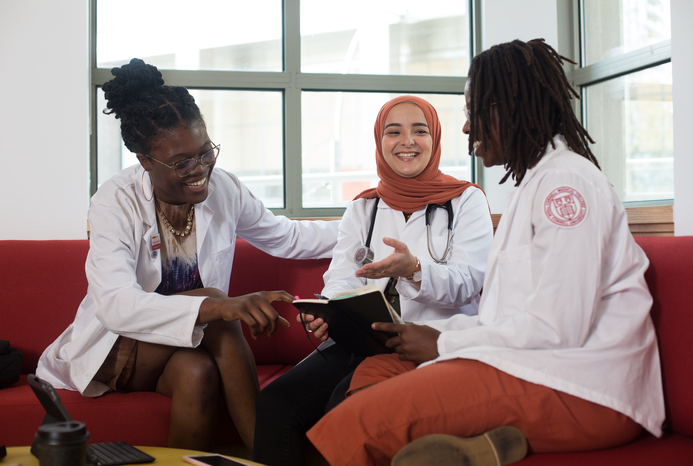Weill Cornell Medicine’s commitment to diversity and inclusion spans all parts of its mission, but starts with education. From its pipeline programs to an increasingly engaged student population, the institution strives to build an inclusive community where the next generation of diverse physicians and scientists are equipped to address issues of health equity and advocate for patients from all backgrounds.
A Pipeline to Medicine and Community Care
Weill Cornell Medicine’s vast array of pipeline programs strive to offer access and exposure to careers in science and medicine to underrepresented student groups at all educational levels, as well as engage communities on issues of health and wellness.
This spring, the Cornell Center for Health Equity’s Diversity Center of Excellence launched a new program, in collaboration with a number of New York-based medical schools, for undergraduate STEM students interested in the medical and health fields. The COVID-19 STEM Community Education and Empowerment Internshipfocuses on areas including the dissemination of information about COVID-19 and vaccination for diverse communities, vaccine science and approaches to community education regarding COVID-19 vaccination. A collaborative effort, the program has recruited 775 diverse students from 28 states, Puerto Rico, Washington, D.C. and three international schools.
The students meet virtually to engage on the issues, culminating with a capstone project for which participants will create social media campaigns or presentations about the vaccine focused on lay audiences and commit to speaking to at least 10 people about getting vaccinated.Program speakers include Dr. Thomas Frieden, former director of the Centers for Disease Control and Prevention; Dr. Torian Easterling, first deputy commissioner/chief equity officer of the New York City Department of Health and Mental Hygiene; and Dr. Kristen Marks, associate professor of medicine and site principal investigator for the Moderna vaccine trial at Weill Cornell Medicine and NewYork-Presbyterian/Weill Cornell Medical Center.
Read more about the many Weill Cornell Medicine pipeline student programs here.
Making Their Voices Heard
Weill Cornell Medicine is also host to a wide range of student-led groups, focused on bringing together people from diverse backgrounds for fellowship and support, and seeking to improve healthcare for underserved communities. For these future doctors, the importance of embracing activism is integral to their professional duties as both healthcare providers and patient advocates.
Last June, Weill Cornell’s student-run chapters of White Coats For Black Lives and the Student National Medical Association organized a virtual town hall, “Conversations on Black: Impacts on Structural Racism on Blacks in America and WCM,” to discuss racism in medicine. The event allowed medical students to mourn the deaths of Black Americans at the hands of police officers and celebrate those lives lost with photos and stories, while also providing a forum for students to share emotional stories about injustices they have faced or witnessed. Students spoke out about structural racism in all forms and its overall impact—calling for greater attention and accountability to episodes of unconscious bias and its lasting harms, advocating for enhanced social justice, an increase in diversity of teaching faculty, and the urgent need to make healthcare anti-racist.
The Asian Pacific American Medical Student Association hosted an online event in March, “Sharing Space: Anti-Asian Bias,” bringing students together to speak out about the hate crimes and discrimination against Asian Americans and Pacific Islanders (AAPI) on both a local and national level. At the event, students discussed the wave of recent incidents and how they illustrate a long history of anti-Asian/AAPI and anti-immigrant sentiment in this country. They mourned the deaths of known victims of hate crimes and honored those lives with photos and stories. Members of other student organizations including the Queer Health Alliance, South Asian Student Medical Association, Latino Medical Student Association and the Student National Medical Association showed support as allies and in solidarity, sharing anonymous experiences on behalf of their Asian/AAPI classmates.
Learn more about these and other student-led organizations at Weill Cornell Medicine here.

